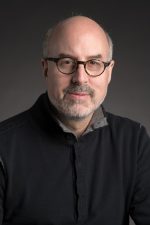As director of the Dark Energy Survey, an international collaboration to map several hundred million galaxies using one of the world’s most powerful digital cameras, Fermilab scientist Josh Frieman leads more than 400 scientists from over 25 institutions across the world in the quest to unravel mysteries of the universe.
The role, he says, has given him the opportunity to work with diverse groups of people toward a common goal, a skill that comes in handy as he takes on the role of Particle Physics Division head at the Department of Energy’s Fermi National Accelerator Laboratory.
“Not only is Josh an outstanding scientist, he’s demonstrated an ability to lead a collaboration of hundreds of researchers who are situated all over the world,” said Fermilab Deputy Director Joe Lykken. “It requires a kind of cooperative spirit and skill that makes him perfect to lead one of the largest and most scientifically diverse divisions at Fermilab.”
With a physicist for a father, Frieman said physics was certainly in the air when he was growing up. But it wasn’t until he was halfway through his undergraduate career that he discovered his passion for cosmology.
“It was around 1980,” he said, “when the field was starting to go through a renaissance by marrying ideas from particle physics with cosmology so that we could make theories of the early universe. The idea of cosmology as archaeology on the grand scale — that we could make observations of the universe and use them like pottery shards to piece together the first few moments after the Big Bang — was very compelling to me. That’s how I decided to become a physicist, through the desire to understand the beginning of the universe.”
Frieman did his graduate work on cosmological theory at the University of Chicago, going on to complete a postdoctoral position at SLAC National Accelerator Laboratory. In the late 1980s, he returned to Illinois to join the scientific staff at Fermilab, teaching astronomy and astrophysics part-time at the University of Chicago.
Although Frieman started out in cosmological theory, as the field of cosmology evolved, his interests became increasingly entangled with observations as opposed to pure theory, he says. In the late 1990s, he began working on the Sloan Digital Sky Survey, a project that later inspired him and other colleagues to develop the idea for the Dark Energy Survey.
“My career has been partly a migration or expansion from theory to observations,” Frieman said, “though I still think of myself as a lapsed or recovering theorist. Over that evolution, I have become involved with larger and larger international collaborations.”
Frieman takes over as head of the Particle Physics Division from Fermilab scientist Patty McBride, who will become deputy spokesperson of the CMS experiment at the European laboratory CERN.
“I think Patty did an outstanding job steering the division for the last several years,” Frieman said. “She also created a very efficient and effective division office and has been very helpful to me through this transition.”
The Particle Physics Division is home to a number of major efforts at Fermilab, including as an anchor to the U.S. participation in and contribution to the CMS experiment. The division also leads the laboratory’s muon program, and it works to answer questions about dark energy, dark matter and the cosmic microwave background. In support of these scientific efforts, Frieman said, the division has a large complement of people conducting technical and engineering work as well as research and development towards new sorts of technologies for high-energy physics experiments.
“It’s quite a broad portfolio, and part of the division head’s responsibilities is managing all of that effort,” Frieman said. “I’m hoping to enable people to accomplish the different objectives of each of those projects, which involve designing, building, operating and analyzing particle physics experiments, understanding them through theory, and interpreting and providing context for them.”
Frieman said one of his main focuses is going to be working with the scientific staff to create a new vision for how to probe cosmic phenomena such as dark energy, dark matter and cosmic inflation, areas in which he has a wealth of experience.
“I’m looking forward to the excitement of creating that plan and putting the laboratory on a good path toward its future in the cosmic frontier,” he said.
He is also looking forward to learning about other areas of the lab with which he’s had less contact over the course of his career, such as other theoretical work, muon experiments, the lab’s contributions to the CMS experiment, and the technical work and R&D activities that go into the lab’s efforts.
“I’ve been working at Fermilab since the late 1980s, but we tend to get siloed into our particular efforts,” he said. “A lot of the excitement for me is just meeting new colleagues or existing colleagues who may have been in a different hallway or a different building, and starting to learn what they’re doing so that I can understand their concerns and learn how best to support them to make them as successful as they can be.”
To Frieman, the most rewarding aspect of working in physics is working with people to make discoveries about the universe.
“What I’m looking forward to most is the continued excitement of discovery,” Frieman said. “It’s why many of us go into science. Increasingly we see that science, and in particular big science like particle physics, has become a real team or even community effort. And these communities face significant challenges. I see a large part of my job as fostering a positive environment in which this community can thrive so that people can do their best work and make fundamental discoveries. We’re making progress here every day, and that’s quite exciting.”




